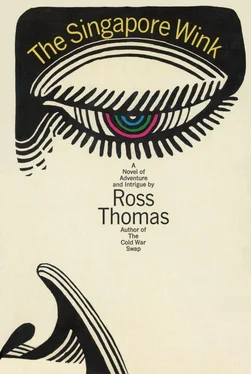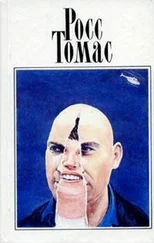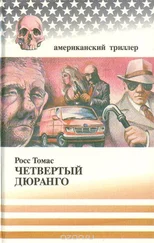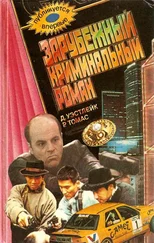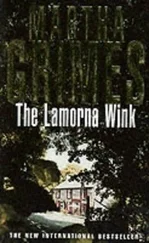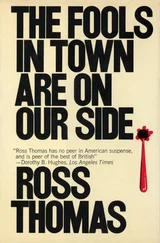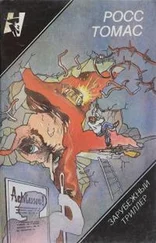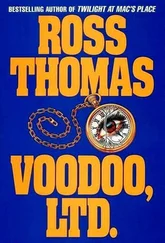“That doesn’t make you invisible,” Trippet said.
“Watch,” Nash said.
The only thing that I could tell about the car that had been following us was that it was painted a dark color and it had two men in the front seat. Neither of them wore hats and I couldn’t see their faces because they turned their heads as they sped past the parked Jaguar. Another car, also containing two men, roared by a few moments later. It looked like a Ford, but I wasn’t sure.
Nash started the engine again, switched on his lights, and pulled back onto the highway. “They didn’t stop, you notice,” he said. “They didn’t want us to think they were tailing us.”
“You can follow from the front as well as from the rear,” I said.
“Watch,” Nash said.
Ahead of us we could see the taillights of the two cars that had passed while we were parked. The tail-lights of the lead car flashed as its brakes came on and the lights veered to the right, crossed the center line, then skittered to the left. The brake warning lights went off and suddenly the regular taillights rose up in the air, turned over three times, and went out. The car that was following pulled sharply to the right, slowed, and then sped on. The four-door black Chevelle was nowhere in sight.
“See what I mean,” Nash said.
We were almost abreast of the car that had gone off the road. It had rolled three times and it had come to rest on its top, prevented from rolling any farther by the splintered palm tree that it had crunched into. A crowd was beginning to gather. “Stop,” I told Nash.
“I’m not stopping,” he said. “We’re late now; you want to see Sacchetti or not?”
“Stop or I’ll break your goddamned neck,” I said.
“Don’t tell me what to do, Cauthorne.”
I leaned forward, slipped my right arm around his neck, and pressed my wrist against his adam’s apple. “Stop,” I said again, and eased off the pressure.
Nash stopped the car and I got out and hurried back towards the wreck. Trippet was close behind. It was almost a fifty-yard walk back to the car and by the time we got there the occupants had been pulled from the wreckage. The car was a Rover sedan and it looked to be a total loss. Gasoline trickled from its tank. The crowd chattered away in Chinese and Malay and one bystander shined a flashlight on the faces of the two occupants of the car who had been carried or dragged to the side of the road. One was Detective-Sergeant Huang who had lost an eye somehow. The other was Detective-Sergeant Tan whose legs were folded under him in an impossible position. Both of them were dead.
“Know who they are?” Trippet said.
“Singapore police. They were the ones who talked to me.”
“Could you tell how it happened?” he said.
“No,” I said. “Could you?”
“I’m not sure, but I think that the Chevelle forced them to swerve. It came out of nowhere from the left. Then a tire must have blown.”
“Or someone shot it out.”
“I didn’t hear anything,” Trippet said, “and that’s a damned difficult shot.”
“So were the ones that missed us this afternoon and I didn’t hear those either.”
“Wasn’t that some kind of signal that Nash gave the Chevelle when he blinked his lights?” Trippet said.
“It was a signal.”
“They had it worked out in advance.”
“Not all the way,” I said. “It must have been a contingency plan.”
“Now they’ll be looking for Sacchetti because of two dead policemen.”
“They’ll never prove it,” I said. “Did you see anything that you can swear to?”
“No.”
“Neither did I.”
There wasn’t anything to be done for Tan and Huang so we went back to the Jaguar and got in.
“They’re both dead,” Trippet told Nash.
“Too bad. You ready now?”
“We’re ready,” I said.
Two miles from the wreck Nash turned right onto a dirt road and bounced past houses that were built on stilts over swamp and water. It seemed to grow hotter. Nobody said anything until he pulled the car up at what was apparently the end of the road. “From here on, we walk,” he said.
We got out and followed him down a path that led to a crude dock.
“This the strait?” I said.
“This is it.”
“Now what?”
“We wait,” Nash said. “Somebody’ll be along.”
We waited five minutes and then I could hear the oar-locks of a rowboat. Nash said something in Chinese and a voice answered. It sounded familiar.
“This way,” Nash said. He headed out to the end of the dock and Trippet and I followed. A rowboat was drawn up alongside and a man was standing up, holding onto the dock. “You two into the stern,” Nash said.
The man in the boat turned on a flashlight and Trippet and I crawled down into the boat. “Let them hold the light for me,” Nash said. The man who was standing up passed the flashlight to Trippet and he shined it on the bow of the boat. Nash got in. Trippet flashed the light over the man who was standing up in the boat and I understood why his voice seemed familiar. He was the tall, lean Chinese who had once shot at me on Raffles Place and later had clubbed me unconscious with a revolver in the saloon of The Chicago Belle. He looked almost naked without his pistol.
The Chinese shoved us off from the dock and then sat down and unshipped the oars. He rowed for fifteen minutes. Then we bumped against a large dim bulk and Nash said, “Okay, up the ladder. Use the flashlight.”
Trippet shined the flashlight around until he found a rope ladder with wooden steps. “You guys first,” Nash said.
“This your kumpit? ” I said.
“This is it.”
From its running lights the Wilfreda Maria seemed to be about sixty or seventy feet long. I climbed up the ladder and then helped Trippet onto the deck. We let Nash manage by himself. The deck was lighted by five or six haphazardly placed naked bulbs and by the glow from the windows of what seemed to be a cabin and a wheelhouse that was aft. Nash headed for it. “This way,” he said and I noticed that the Chinese who had rowed the boat was right behind us.
“You sure Sacchetti is here?” I said, and my voice cracked like a thirteen-year-old adolescent’s.
Nash grinned. “You’re really eager, aren’t you, Cauthorne?”
“I’ve waited long enough.”
“The great man is just inside,” he said. “Right through that door.”
I put my hand on the knob, then stopped, because it seemed for a moment that the shakes and the horrors were due, but that passed, and I opened the door. Inside there were two bunks, some chairs, and a deal table that held a gin bottle and a glass. The man in the blue shirt who sat behind the table stared at me curiously for what seemed to be a long time. Then he said, “Hello, Cauthorne,” but neither his face nor his voice belonged to Angelo Sacchetti.
They belonged to Sam Dangerfield.
Trippet, Nash and the lean Chinese had followed me into the cabin whose stifling small space reeked of stale sweat, mingled with the odor of rotting copra that had the sweet and sour locker room smell of old jock straps and dirty sneakers.
“Hello, Sam,” I said.
“Sit down,” Dangerfield said. “Want a drink? Don’t think I ever offered you a drink before, did I?”
“Not of your own booze.”
“Well?”
“No thanks.”
“This your partner?” he said, nodding his head at Trippet.
“That’s right.”
“Trippet, isn’t it?”
“Yes,” I said.
“Sit down, Mr. Trippet.”
We all sat down, except for the Chinese who stood by the door, his arms folded across his chest. “You were getting too close, Cauthorne,” Dangerfield said as he burrowed his blue eyes into me. “You’re dumb, but you were getting too close.”
Читать дальше
